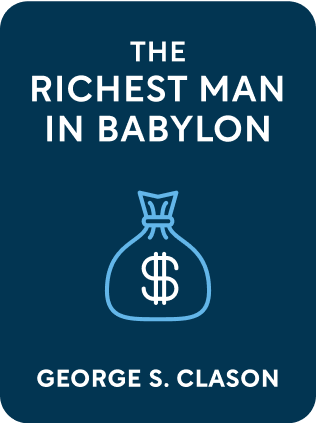

This article is an excerpt from the Shortform book guide to "The Richest Man in Babylon" by George S. Clason. Shortform has the world's best summaries and analyses of books you should be reading.
Like this article? Sign up for a free trial here .
What are the 5 laws of gold? How does applying these laws help you acquire wealth and become more successful?
The 5 laws of gold are the principles that originated with Arkad, the richest man in Babylon, and then popularized by a camel trader Kalabab. The laws of gold, which focus on building wealth, overlap with Arkad’s seven cures of a lean purse.
Without further ado, here is the story of Arkad’s laws of gold and what they mean.
The 5 Laws of Gold
The “Five Laws of Gold” are revealed in a campfire tale by a wealthy camel trader, Kalabab. He starts by asking his audience which they would choose: a bag of gold or a clay tablet inscribed with wisdom. Everyone opts for the gold. However, he points out that without wisdom, they’d just waste the gold and end up back where they started.
Gold (or money), he says, accrues only to those who understand the laws governing it. Kalabab then explains the 5 laws of gold, which he says originated with Arkad who passed them onto his son, Nomasir, for whom Kalabab once worked.
1) You acquire gold by saving regularly (at least a tenth of your earnings) to build wealth for a secure future.
2) Gold grows when you invest it, along with the interest you receive on it, wisely.
3) Your gold will stick around and grow if you follow competent advice from financial experts.
4) You’ll lose your gold if you follow bad advice or rely solely on your own judgment when you lack experience.
5) You’ll also lose your gold if you succumb to the allure of get-rich-quick schemes or risky investment strategies that promise huge payoffs.
How Nomasir Learned the Laws of Gold
When Nomasir became an adult, his father Arkad considered naming him as his successor and putting Nomasir in charge of his estate. However, to first make sure Nomasir wouldn’t squander his wealth, Arkad gave him a test: a bag of gold, a tablet containing the five laws of gold, and instructions to return in ten years to report on what he accomplished. This was Nomasir’s eventual report:
Nomasir first traveled with a caravan to Nineveh, where he bet and lost some of his money on a horse race that turned out to have been rigged. Then he invested more of his gold in a partnership with a fellow traveler to purchase a store, but the partner was foolish and the business failed. Out of money, Nomasir sold many of his belongings for food and shelter, and he decided to read the tablet containing the laws of gold. After reading the advice, he was determined to make up for his mistakes.
He got a job managing a crew of slaves who were building a city wall and, in accordance with the laws of gold, he saved part of his earnings. His boss noticed his frugality and offered him a solid investment opportunity. Following the third law about heeding competent advice, Nomasir agreed to participate. Realizing that when the city wall was finished, a gate would be needed, the men pooled their resources to purchase metal from distant mines, which they sold to the king for the gate at a profit. Over time, the group joined in other successful ventures after careful analysis, and Nomasir was able not only to recoup his father’s money, but also to triple it.
Arkad was pleased with the return on his investment in Nomasir and entrusted his son with management of his estate.
Exercise: Putting the Laws of Gold to Work for You
The character Nomasir initially failed to follow the “laws of gold” and ended up losing money his father had given him. But he learned from his mistakes, started over, and eventually succeeded.
Have you ever made a financial mistake and lost money? What was your mistake? Did it violate one of the principles or laws of gold? How?
What did you do about your mistake? What impact has it had on how you have managed your money since then?
What would your advice be to someone facing a similar situation?

———End of Preview———
Like what you just read? Read the rest of the world's best book summary and analysis of George S. Clason's "The Richest Man in Babylon" at Shortform .
Here's what you'll find in our full The Richest Man in Babylon summary :
- A compilation of financial advice pamphlets distributed by banks and insurance companies in the 1920s
- Timeless principles for managing your money
- An entertaining story written in the form of three parables






